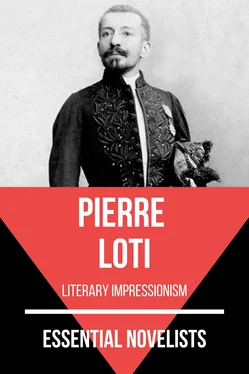1 ...7 8 9 11 12 13 ...18 I stepped out upon the veranda, and there I paused, gazing into the depths of the starlit night. Beneath me Nagasaki lay asleep, wrapped in a soft, light slumber, hushed by the murmuring sound of a thousand insects in the moonlight, and fairy-like with its roseate hues. Then, turning my head, I saw behind me the gilded idol with our lamps burning in front of it; the idol smiling the impassive smile of Buddha; and its presence seemed to cast around it something, I know not what, strange and incomprehensible. Never until now had I slept under the eye of such a god.
In the midst of the calm and silence of the night, I strove to recall my poignant impressions of Stamboul; but, alas, I strove in vain, they would not return to me in this strange, far-off world. Through the transparent blue gauze appeared my little Japanese, as she lay in her sombre night-robe with all the fantastic grace of her country, the nape of her neck resting on its wooden block, and her hair arranged in large, shiny bows. Her amber-tinted arms, pretty and delicate, emerged, bare up to the shoulders, from her wide sleeves.
“What can those mice on the roof have done to him?” thought Chrysantheme. Of course she could not understand. In a coaxing manner, like a playful kitten, she glanced at me with her half-closed eyes, inquiring why I did not come back to sleep—and I returned to my place by her side.
––––––––
CHAPTER XI. A GAME OF ARCHERY
JULY 14TH.
––––––––

THIS IS THE NATIONAL Fete day of France. In Nagasaki Harbor, all the ships are adorned with flags, and salutes are fired in our honor.
Alas! All day long, I can not help thinking of that last fourteenth of July, spent in the deep calm and quiet of my old home, the door shut against all intruders, while the gay crowd roared outside; there I had remained till evening, seated on a bench, shaded by an arbor covered with honeysuckle, where, in the bygone days of my childhood’s summers, I used to settle myself with my copybooks and pretend to learn my lessons. Oh, those days when I was supposed to learn my lessons! How my thoughts used to rove—what voyages, what distant lands, what tropical forests did I not behold in my dreams! At that time, near the garden-bench, in some of the crevices in the stone wall, dwelt many a big, ugly, black spider always on the alert, peeping out of his nook ready to pounce upon any giddy fly or wandering centipede. One of my amusements consisted in tickling the spiders gently, very gently, with a blade of grass or a cherry-stalk in their webs. Mystified, they would rush out, fancying they had to deal with some sort of prey, while I would rapidly draw back my hand in disgust. Well, last year, on that fourteenth of July, as I recalled my days of Latin themes and translations, now forever flown, and this game of boyish days, I actually recognized the very same spiders (or at least their daughters), lying in wait in the very same places. Gazing at them, and at the tufts of grass and moss around me, a thousand memories of those summers of my early life welled up within me, memories which for years past had lain slumbering under this old wall, sheltered by the ivy boughs. While all that is ourselves perpetually changes and passes away, the constancy with which Nature repeats, always in the same manner, her most infinitesimal details, seems a wonderful mystery; the same peculiar species of moss grows afresh for centuries on precisely the same spot, and the same little insects each summer do the same thing in the same place.
I must admit that this episode of my childhood, and the spiders, have little to do with the story of Chrysantheme. But an incongruous interruption is quite in keeping with the taste of this country; everywhere it is practised, in conversation, in music, even in painting; a landscape painter, for instance, when he has finished a picture of mountains and crags, will not hesitate to draw, in the very middle of the sky, a circle, or a lozenge, or some kind of framework, within which he will represent anything incoherent and inappropriate: a bonze fanning himself, or a lady taking a cup of tea. Nothing is more thoroughly Japanese than such digressions, made without the slightest apropos.
Moreover, if I roused my past memories, it was the better to force myself to notice the difference between that day of July last year, so peacefully spent amid surroundings familiar to me from my earliest infancy, and my present animated life passed in the midst of such a novel world.
To-day, therefore, under the scorching midday sun, at two o’clock, three swift-footed djins dragged us at full speed—Yves, Chrysantheme, and myself—in Indian file, each in a little jolting cart, to the farther end of Nagasaki, and there deposited us at the foot of some gigantic steps that run straight up the mountain.
These are the granite steps leading to the great temple of Osueva, wide enough to give access to a whole regiment; they are as grand and imposing as any work of Babylon or Nineveh, and in complete contrast with all the finical surroundings.
We climb up and up—Chrysantheme listlessly, affecting fatigue, under her paper parasol painted with pink butterflies on a black ground. As we ascended, we passed under enormous monastic porticoes, also in granite of rude and primitive style. In truth, these steps and these temple porticoes are the only imposing works that this people has created, and they astonish, for they do not seem Japanese.
We climb still higher. At this sultry hour of the day, from top to bottom of the enormous gray steps, only we three are to be seen; on all that granite there are but the pink butterflies on Chrysantheme’s parasol to give a cheerful and brilliant touch.
We passed through the first temple yard, in which are two white china turrets, bronze lanterns, and the statue of a large horse in jade. Then, without pausing at the sanctuary, we turned to the left, and entered a shady garden, which formed a terrace halfway up the hill, at the extremity of which was situated the Donko-Tchaya—in English, the Teahouse of the Toads.
This was the place where Chrysantheme had wished to take us. We sat down at a table, under a black linen tent decorated with large white letters (of funereal aspect), and two laughing ‘mousmes’ hastened to wait upon us.
The word ‘mousme’ means a young girl, or very young woman. It is one of the prettiest words in the Nipponese language; it seems almost as if there were a little pout in the very sound—a pretty, taking little pout, such as they put on, and also as if a little pert physiognomy were described by it. I shall often make use of it, knowing none other in our own language that conveys the same meaning.
Some Japanese Watteau must have mapped out this Donko-Tchaya, for it has rather an affected air of rurality, though very pretty. It is well shaded, under a shelter of large trees with dense foliage, and a miniature lake close by, the chosen residence of a few toads, has given it its attractive denomination. Lucky toads, who crawl and croak on the finest of moss, in the midst of tiny artificial islets decked with gardenias in full bloom. From time to time, one of them informs us of his thoughts by a ‘Couac’, uttered in a deep bass croak, infinitely more hollow than that of our own toads.
Under the tent of this tea-house, we sit on a sort of balcony jutting out from the mountain-side, overhanging from on high the grayish town and its suburbs buried in greenery. Around, above, and beneath us cling and hang, on every possible point, clumps of trees and fresh green woods, with the delicate and varying foliage of the temperate zone. We can see, at our feet, the deep roadstead, foreshortened and slanting, diminished in appearance till it looks like a sombre rent in the mass of large green mountains; and farther still, quite low on the black and stagnant waters, are the men-of-war, the steamboats and the junks, with flags flying from every mast. Against the dark green, which is the dominant shade everywhere, stand out these thousand scraps of bunting, emblems of the different nationalities, all displayed, all flying in honor of far-distant France. The colors most prevailing in this motley assemblage are the white flag with a red ball, emblem of the Empire of the Rising Sun, where we now are.
Читать дальше













